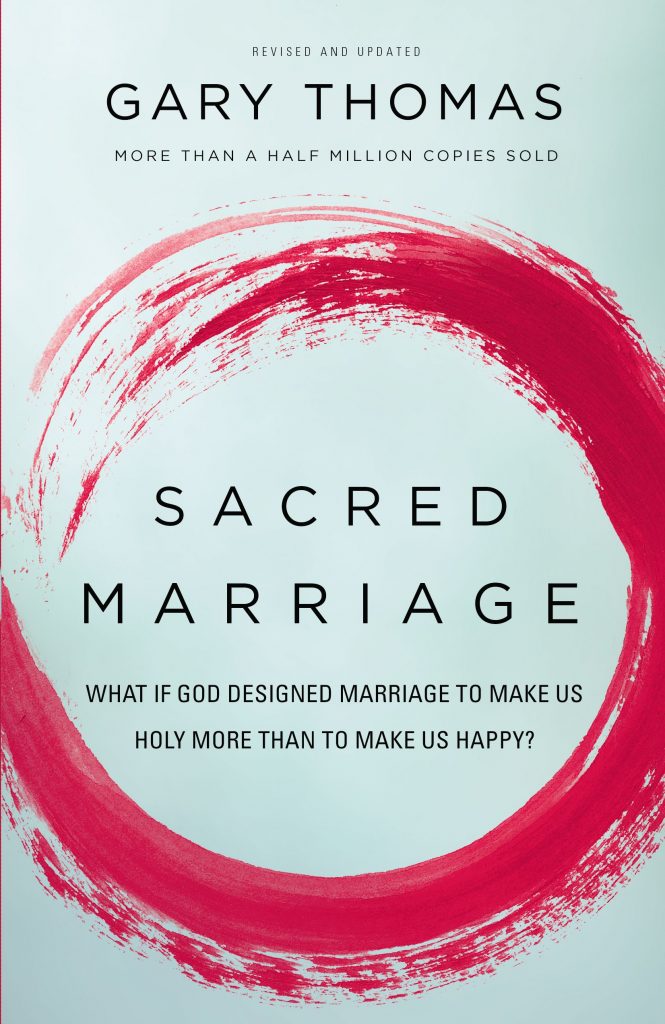Marital Analogies Teach Us Truths about God
“[Marriage] is the merciless revealer, the great white searchlight turned on the darkest places of human nature.” – Katherine Anne Porter
For about a decade after college, I joined eight of my former classmates for an annual weekend retreat. On one particular retreat, a good friend pulled me aside and mentioned that he was considering returning home that night; he and his wife were hoping to conceive another child, and by his wife’s calculations the time was right.
“Do it,” I urged him. “You can be back by breakfast.”
“I don’t know . ..,” he said hesitantly. “Do it,” I said more strongly, and another friend weighed in with his support.
Finally, he gave in and went home. That night a child was conceived.
I look at that child now and smile, wondering if he’ll ever know how close he came to not being (and how much he owes me!). There are few more dizzying realities of life than cooperating with God to produce another human being. If my friend and his wife had waited another month, perhaps they would have had a girl or a shorter boy or a boy with darker hair. It’s amazing.
 This aspect of the marital experience— cooperating with God to bring children into being— should be particularly meaningful for Christians (and a key reason that having difficulty conceiving can be so painful to so many couples). The picture of God as Creator is central to his authority, identity, and purpose. In fact, the Bible is framed around the fact that God is Creator. The first thing we learn about God in the book of Genesis is that he created the heavens and the earth (Genesis 1:1); the last image of the New Testament shows God creating a new heaven and a new earth. When God says, “I am making everything new!” (Revelation 21:5), the word making is in the present tense. It’s an ongoing process. God walks into eternity creating.
This aspect of the marital experience— cooperating with God to bring children into being— should be particularly meaningful for Christians (and a key reason that having difficulty conceiving can be so painful to so many couples). The picture of God as Creator is central to his authority, identity, and purpose. In fact, the Bible is framed around the fact that God is Creator. The first thing we learn about God in the book of Genesis is that he created the heavens and the earth (Genesis 1:1); the last image of the New Testament shows God creating a new heaven and a new earth. When God says, “I am making everything new!” (Revelation 21:5), the word making is in the present tense. It’s an ongoing process. God walks into eternity creating.
This is just one of several analogies that connect various aspects of marriage with our understanding of God. In this chapter, we’ll explore how these various analogies use the experience of marriage to teach us valuable truths about the nature of God. Through the experience of being married, we can come to know God in new ways.
 DIVINE ROMANCE
DIVINE ROMANCE
The prophet Hosea leads us into a startling reality—that God views his people as a husband views his wife: “ ‘In that day,’ declares the Lord, ‘you will call me “my husband”; you will A giant thread runs throughout Scripture comparing God’s relationship to his people with the human institution of marriage. Sacred Marriage 30 no longer call me “my master.” . .. I will betroth you to me forever’ ” (Hosea 2:16, 19). Think about the difference between a husband and a master— and all that these images conjure up in your mind. God wants us to relate to him with an obedience fueled by love and intimacy, not by self-motivated fear, and with a loyalty to a divine-human relationship, not a blind adherence to “principles.” A husband harbors a passion toward his wife that is absent in a master toward his slave.
How do you view God— as a master or as a husband?
Isaiah uses marital imagery to stress how God rejoices in his people: “As a bridegroom rejoices over his bride, so will your God rejoice over you” (Isaiah 62:5). We live in a world in which many people are simply too busy or too preoccupied to notice us. But God delights in us. We make his supernatural heart skip a beat.
At times, Jesus himself employed this marital imagery, referring to himself as the “bridegroom” (Matthew 9:15) and to the kingdom of heaven as a “wedding banquet” (Matthew 22:1–14). This picture is carried over into the culmination of earthly history, as the book of Revelation talks about “the wedding of the Lamb” in which “his bride has made herself ready” (Revelation 19:7).
The breakdown of spiritual fidelity is often depicted with marital analogies as well. Jeremiah compares idolatry with adultery: “I gave faithless Israel her certificate of divorce and sent her away because of all her adulteries” (Jeremiah 3:8). Jesus picked up on this same imagery, referring to an “adulterous” generation (Mark 8:38). In context, Jesus is not attacking human sexual foibles; he is agonizing over a spiritually unfaithful nation that is violating its divine marriage to God.
Throughout Christian history, teachers have explored the similarities between the marital union and the various mysteries of faith that also involve a union: Besides the Trinity there is the joining of divinity and humanity in the person of Jesus Christ; the Eucharist, in which the bread and the wine are joined to signify the body and blood of Christ; Christ’s union with his church; and other similar analogies.
Ruminating on these analogies is not merely amusing wordplay. For Christians seeking to gain spiritual insight from their marriage, these analogies provide the necessary ingredients for serious, contemplative reflection. The reason God became flesh was so that we might know him. Correspondingly, God did not create marriage just to give us a pleasant means of repopulating the world and providing a steady societal institution for the benefit of humanity; he planted marriage among humans as another signpost pointing to his own eternal, spiritual existence.
As humans with finite minds, we need the power of symbolism in order to gain understanding. By means of the simple relationship of a man and a woman, the symbol of marriage can call up virtually infinite meaning. This will happen only when we use our marriage to explore God. If we are consumed with highlighting where our spouses are falling short, we will miss the divine mysteries of marriage and the lessons it has to teach us.
In the next section, we’re going to accent one particular analogy to showcase how these life-pictures can bring together our marriage and our faith and also teach us about the purpose of marriage. While future chapters may seem more “practical,” it’s important to briefly explore the doctrine behind Christian marriage and what makes the marriages of believers different from the marriages of unbelievers. This difference is showcased in the preeminent marital analogy of Christ and his church.
RECONCILIATION
There’s an old rabbinical story about how the spot was chosen for God’s holy temple. Two brothers worked a common field and a common mill. Each night, they divided whatever grain they had produced and took their own portion home.
 God planted marriage among humans as another signpost pointing to his own eternal, spiritual existence.
God planted marriage among humans as another signpost pointing to his own eternal, spiritual existence.
One brother was single, and the other was married with a large family. The single brother decided that his married brother, with all those kids, certainly needed more grain than he did, so at night he secretly crept over to his brother’s granary and gave him an extra portion. The married brother realized that his single brother didn’t have any children to care for him in his old age. Concerned about his brother’s future, he got up each night and secretly deposited some grain into his single brother’s granary.
One night they met halfway between the two granaries, and each brother realized what the other was doing. They embraced, and as the story goes, God witnessed what happened and said, “This is a holy place— a place of love— and it is here that my temple shall be built.” The holy place is that spot where God is made known to his people, “the place where human beings discover each other in love.”1
Marriage can be that holy place, the site of a relationship that proclaims God’s love to this world. Notice what makes this story so moving: two individuals who have greater empathy for the difficulties in each other’s situation rather than in their own. Selfish marriage is the opposite: each partner feels their own pain more intensely and their spouse’s pain callously.
For all their ambivalence about whether marriage is an inferior state, the early church fathers at least recognized that the analogy of reconciliation is the highest aim of marriage, pointing as a sign to the union of Christ with his church. Paul explores this theme in his letter to the Ephesians (5:22 – 33).
One of these early thinkers, Augustine (AD 354–430), suggested three benefits of marriage: offspring, faith (fidelity), and sacrament. Of the three benefits, he clearly points to the latter (sacrament) as the greatest. This is because it is possible to be married without either offspring or faith, but it is not possible to be (still) married without indissolubility, which is what a sacrament points toward. As long as a couple is married, they continue to display— however imperfectly— the ongoing commitment between Christ and his church. Thus, simply “sticking it out” becomes vitally important.
Centuries after Augustine, Anglican Reformers responded to these three blessings with three “causes.” An early (1549) prayer book suggests that marriage is for procreation, a remedy against sexual sin, and mutual comfort.2 This last element, unfortunately, replaced the sacramental aspect of marriage (namely, showcasing Christ and his church) with something much more pedestrian (namely, relational comfort).
Knowing why we are married and should stay married is crucial. The key question is this: Will we approach marriage from a God-centered view or a self-centered view? In a self-centered view, we will maintain our marriage as long as our earthly comforts, desires, and expectations are met. In a God-centered view, we preserve our marriage because it brings glory to God and points a sinful world to a reconciling Creator.
More than seeing marriage as a mutual comfort, we must see it as a word picture of the most important news humans have ever received— that there is a divine relationship between God and his people. Paul explicitly makes this analogy in his letter to the Ephesians. You’ve probably read these words (or heard these words quoted) dozens, if not hundreds, of times: “Husbands, love your wives, just as Christ loved the church and gave himself up for her to make her holy, cleansing her by the washing with water through the word, and to present her to himself as a radiant church, without stain or wrinkle or any other blemish, but holy and blameless” (Ephesians 5:25 –27).
Though theologically I am on the side of the Protestants, I must declare to my early Anglican brothers that I believe it is unfortunate and sad when something as profound as living out an analogy of Christ and his church is reduced to experiencing this relationship as merely something that will help us avoid sexual sin, keep the world populated, and provide a cure for loneliness.
In fact, both the Old and New Testaments use marriage as a central analogy— the union between God and Israel (Old We preserve our marriage because it brings glory to God and points a sinful world to a reconciling Creator. Sacred Marriage 34 Testament) and the union between Christ and his church (the New Testament). Understanding the depth of these analogies is crucial, as they will help us determine the very foundation on which a truly Christian marriage is based. If I believe the primary purpose of marriage is to model God’s love for his church, I will enter this relationship and maintain it with an entirely new motivation, one hinted at by Paul in his second letter to the Corinthians: “So we make it our goal to please him” (2 Corinthians 5:9). The goal of my marriage will be to please God.
 WHAT MAKES GOD HAPPY?
WHAT MAKES GOD HAPPY?
Paul answers a lot of questions for us when he writes, “We make it our goal to please him.” Ask ten people on the street what their goal in life is, and you’ll get an amazing variety of answers. For the Christian, Paul couldn’t be clearer: his “consuming ambition, the motive force behind all he does,”3 is to please God. But Paul doesn’t just say pleasing God is his “consuming ambition”; he assumes it will be ours as well: “We make it our goal to please him.”
When something is the motive force behind all we do, it drives every decision we make. And Paul is crystal clear: The first question we should ask ourselves is, “Will this be pleasing to Jesus Christ?”
The first purpose in marriage— beyond happiness, sexual expression, the bearing of children, companionship, mutual care and provision, or anything else— is to please God. The challenge, of course, is that it is utterly selfless living; rather than asking, “What will make me happy?” we are told that we must ask, “What will make God happy?” And just in case we don’t grasp it immediately, Paul underscores it a few verses later: “Those who live should no longer live for themselves but for him who died for them and was raised again” (2 Corinthians 5:15).
I have no other choice as a Christian. I owe it to Jesus Christ to live for him, to make him my consuming passion and the driving force in my life. To do this, I have to die to my own Finding God in Marriage 35 desires daily. I have to crucify the urge that measures every action and decision around what is best for me. Paul is eloquent about this fact: “We always carry around in our body the death of Jesus, so that the life of Jesus may also be revealed in our body” (2 Corinthians 4:10).
Just as Jesus went to the cross, so I must go to the cross, always considering myself as carrying around “the death of Jesus” so that his new life— his motivations, his purposes, his favor— might dominate in everything I do.
This reality calls me to look at my spouse through Christian eyes: “From now on we regard no one from a worldly point of view” (2 Corinthians 5:16). The reason is clear: “If anyone is in Christ, the new creation has come: The old has gone, the new is here!” (verse 17). Part of this new identity is a new ministry, one that is given to every Christian, as it is inherent in the person of Jesus Christ: “All this is from God, who reconciled us to himself through Christ and gave us the ministry of reconciliation” (verse 18).
Think about this. The very nature of Christ’s work was a reconciling work, bringing us together again with God. Our response is to become reconcilers ourselves. C. K. Barrett defines reconciliation as “to end a relation of enmity, and to substitute for it one of peace and goodwill.”
Clearly Paul is talking about carrying the message of salvation. But we cannot discuss with any integrity the ending of “a relation of enmity” and the dawning of “peace and goodwill” if our marriages are marked by divorce, fighting, and animosity. Everything I am to say and do in my life is to be supportive of this gospel ministry of reconciliation, and this commitment begins by displaying reconciliation in my personal relationships, especially in my marriage.
Read the full book by buying on Amazon or Laterna Bookshop.

